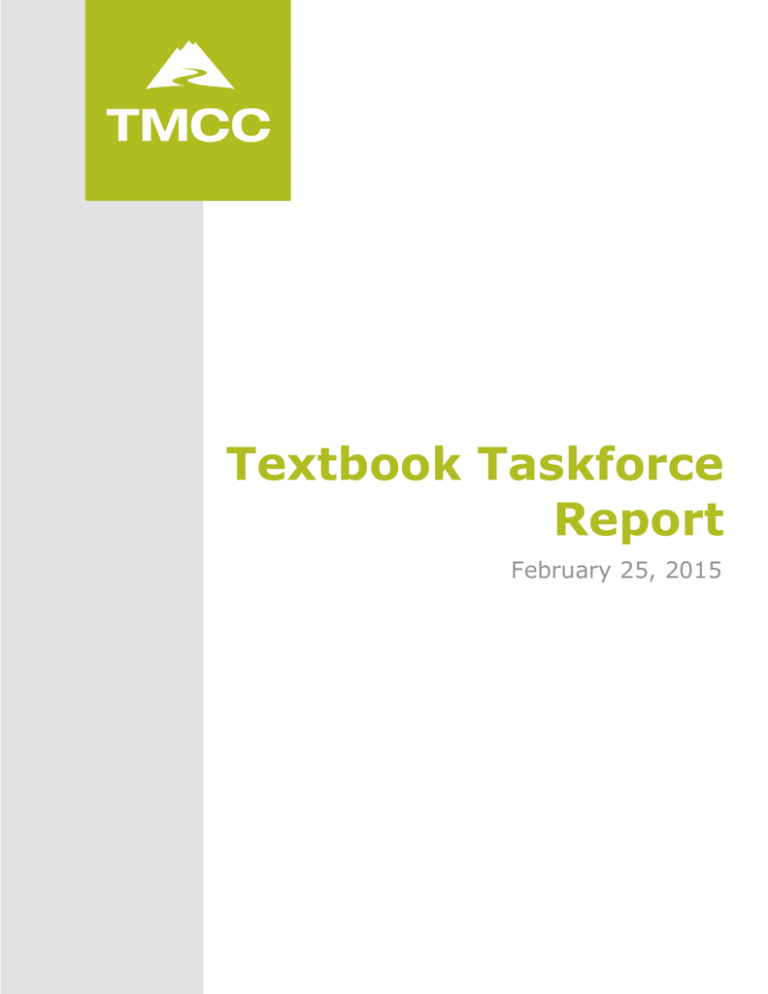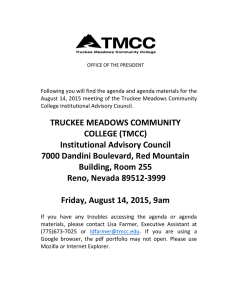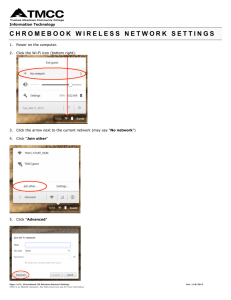
Textbook Taskforce
Report
February 25, 2015
GLOSSARY
Ancillary material: material that may be bundled or not and may be required or not, for a course. Bundling of ancillary
material may impact costs of those materials, and therefore affect the retail price of those materials. (See related term
supplemental. These terms are not synonyms.)
Cost: the amount the retailer (e.g., bookstore) pays a supplier for an item. (See related term retail. These terms are not
synonyms.)
Course materials: any item required or recommended to complete a course including access codes, digital books,
traditional print books, clickers, etc.
Creative Commons license *: Creative Commons enables the sharing and use of creativity and knowledge through free
legal tools. Their “some rights reserved” licenses authorize work to be used under certain specified conditions.
OER * (Open Educational Resources): According to the William and Flora Hewlett Foundation, “OER are teaching,
learning, and research resources that reside in the public domain or have been released under an intellectual property
license that permits their free use and re-purposing by others. Open Educational Resources are explicitly licensed for
certain kinds of use, redistribution, and remixing. You don’t have to worry about fair use. Just follow the specified license.
Open educational resources may include:
•
full courses,
•
course materials,
•
modules,
•
textbooks,
•
streaming videos,
•
tests,
•
software, and
•
any other tools, materials, or techniques used to support access to knowledge."
Price: the “sticker price” or retail price paid by the customer for an item. In this report, we will use the terms retail or
retail price interchangeably, but never to indicate cost. (See the term cost, above.)
Retail, or Retail price: the amount the customer pays for an item. (See related term cost. These terms are not synonyms.)
Supplemental materials: materials not bundled with the text, not required for a course. They may be recommended or
even just suggested material. Example: student solutions manuals. (See related term ancillary. These terms are not
synonyms.)
* From “OER Licensing Information” published by http://www.creativecommons.org
Page 2 of 6;Textbook Taskforce Final Report
TMCC is an EEO/AA institution. See http://eeo.tmcc.edu for more information.
Created: 4/22/2015; Rev: 4/22/2015
2015 TEXTBOOK TASKFORCE REPORT
Truckee Meadows Community College
February 2015
The charge of the TMCC Textbook Taskforce is to bring forth reasonable cost reduction strategies and/or alternative
options that would make textbooks more affordable and accessible for TMCC students. Represented on the Taskforce were
faculty, administrators, the Bookstore Manager, and a student from the Student Government Association. The taskforce
collected information on current trends across the United States, current student perceptions and practices, and explored
options now available to the institution. Members discussed a number of concerns and ideas to help improve the
accessibility and affordability of textbooks for TMCC students and developed recommendations for campus review.
These recommendations are built upon principles to guide faculty and staff in all decisions about course materials for
students. More options are now available to faculty in selecting and to students in where to purchase course materials.
Both students and faculty need more information to ensure the best choice is made in decisions related to learning support
and success. The term “textbook” is becoming dated in many ways as every type of course material comes in many
formats. When the term “textbook” is used in these recommendations, it should be interpreted to include required course
materials.
Students indicated in a Fall 2014 poll that they acquired their textbook from the TMCC Bookstore (37%) or from another
outlet (23 %), through rental from the TMCC bookstore (9%), or through rental from another outlet (23%). Five percent
of students said they did not acquire or use a textbook for their class. Three percent used the library or borrowed from a
friend. Clearly, students are purchasing material from multiple sources in search for the best price, renting books
frequently, or not acquiring the books. Students who attempt to complete the class without the required textbook are less
likely to be successful in the class if the textbook provides necessary information or skills. Therefore, finding ways to
reduce the cost or provide the materials at no cost is critical.
Recommendations
1.
Textbooks adopted for classes should always be:
a.
The most affordable option which will provide essential information or skill development for students.
b.
Essential for students to complete the learning outcomes in a class. Students should never be directed to
buy textbooks which are only partially used or are unnecessary.
c.
Adopted for the longest period possible or advantageous to students to be able to purchase used books.
Consultation with the TMCC Bookstore may provide the option of used books, even if the edition is no
longer in print.
d.
Adopted for at least four-semesters if a custom title so that they can be offered as rentals to students.
e.
Considered for resale value and opportunity for resale. In general, students describe disadvantages of
loose-leaf books and materials. However, there may be some situations in which the advantages of looseleaf materials outweigh the disadvantages. Students should be fully informed of pros and cons of different
modes of delivery and about the choices they have.
2.
To assist faculty in carrying out the first recommendation, these procedures should be in place going forward:
a.
The TMCC Bookstore will include the price to students of materials when distributing the textbook adoption
form for completion. The Bookstore will also be available to give faculty and staff members the student
price of material not previously used. If adoptions contain ancillary material, the bookstore will confirm
with departments and divisions that the material is in fact required and necessary, and if not, will give to
the department the information on how unbundling the packages will impact pricing to the student.
Page 3 of 6;Handbook / Manual Title
TMCC is an EEO/AA institution. See http://eeo.tmcc.edu for more information.
Created: 4/22/2015; Rev: 4/22/2015
b.
If any class has a retail price exceeding $120 for total required course material, the selections shall require
the approval of the Dean based on the necessity of these particular materials. This maximum shall be
reviewed annually for adjustment inflation.
c.
Late orders for textbooks do not allow for an informed decision on the best choice. Timely adoptions allow
for a) sourcing of used books when appropriate from as many sources as possible, b) validation of the
information and other options, c) buyback from current students at the highest level possible, and d)
timely production of alternative format materials for students with disabilities. Per TMCC Faculty Senate
Textbook Policy, it shall be the responsibility of the Chair or Dean to select the textbook for any classes
where the deadline is not met. The only exception to this shall be when classes are added after the
textbook selection deadline. Textbook selections should not be changed after the textbook selection
deadline unless the instructor changes and the new instructor requires the change.
d.
For the benefit of students, the faculty in each department/discipline shall work together to endeavor to
adopt the same learning materials for the same class.
e.
Each department or academic area shall determine the textbooks to be used by part-time faculty for
particular courses. A process should be in place for part-time faculty to provide feedback on the
effectiveness of these texts.
3.
TMCC shall support more use of Open Educational Resources (OER) by faculty in place of textbooks or to
supplement textbooks. These resources are becoming more and more available from excellent sources. The
Taskforce members believe that faculty are open to doing this, but lack the time or expertise to pursue. Therefore,
we suggest that TMCC devote more resources to support faculty through 1) professional training for faculty, (2)
library personnel designated and trained to point faculty to resources about OER, (3) paid additional assignments
for faculty in a discipline to explore and agree on OER options in place of textbooks.
4.
TMCC should promote the adoption of Open-Source textbooks in support of significant textbook savings for TMCC
students. This may include establishing partnerships with OpenStax College (Rice University)
(www.openstaxcollege.org) and the Community College Consortium for Open Educational Resources
(www.oerconsortium.org). OpenStax provides texts in Sociology, Physics, Biology, Anatomy, Statistics,
Precalculus, Economics, Macro-Economics, Micro-Economics, Chemistry, History and Psychology. The College of
Southern Nevada and Western Nevada College have already signed with OpenStax. This adoption would provide a
free text alternative for possible adoption by faculty and is peer-reviewed. The Open Educational Resources
Consortium would provide more than 750 free/low-cost OER textbook titles in a broad array of disciplines and thus
a free/low-cost alternative for possible adoption. Its resources are also peer reviewed. Thirteen California State
University campuses have announced their adoption of OpenStax College textbooks - beginning with the 2015 Fall
term.
5.
To reduce costs for students and support faculty to create custom learning materials and instructor written texts
for their courses, TMCC should provide, through additional assignments or release time, an
advisor/consultant/support person to help faculty produce custom course materials. For four semesters as a trial
period, this person should advise faculty who volunteer with copyright law and related issues, textbook creation,
video. The advisor would need to be familiar with copyright laws, digital textbook creations, video creations, Open
Educational Resources, and homework software options. The instructional advisor would be provided release time
and/or additional salary.
This option of custom textbooks results in drastically lower cost to students, materials
targeted to course and student needs, fixed editions to allow for more used textbooks and to help the Disability
Resource Center. Fixed editions provide faculty more time to improve their courses instead of constantly updating
materials to match new textbook editions which have minimal content differences. This recommendation is not
referring to “custom textbooks” offered by publishers which often cost students more.
6.
TMCC is required to provide access to instructional materials in alternative formats for individuals with disabilities.
Recent court decisions have reinforced the requirement that alternative formats are to be provided in a timely
manner with the same ease of use and effectiveness as formats used by students without disabilities. The Disability
Resource Center can assist faculty in selecting and producing materials which provide equal access for students
with disabilities. The policy is:
Accessible Electronic Information and Technology
Page 4 of 6;Handbook / Manual Title
TMCC is an EEO/AA institution. See http://eeo.tmcc.edu for more information.
Created: 4/22/2015; Rev: 4/22/2015
It is the policy of Truckee Meadows Community College to comply with the Americans with Disabilities Act of
1990 ("ADA"), ADA Amendments Act of 2008 ("ADAAA"), Section 504 of the Rehabilitation Act of 1973, and
Section 508 of the Rehabilitation Act of 1973 as amended by the Workforce Investment Act of 1998.
Truckee Meadows Community College is committed to providing access to information and services, in an
equally effective and integrated manner, regardless of a user’s physical or developmental abilities or
impairments. All TMCC departments and operational units are required to ensure that any electronic
information or technology resources that are created or purchased are accessible.
The Disability Resource Center is the responsible office to carry out this policy. Procedures are posted on its
website.
7.
As a best practice, a copy of books assigned in classes should be placed on reserve in the Library for students to
use. The cost of TMCC purchasing and placing every required book on reserve in the library in the first semester
would be approximately $50,000. In subsequent semesters, the cost would decrease since some textbooks would
be used again. A review of two months of “check outs” of class books on reserve in Fall 2014 showed significant
use by students, particularly in General Education courses. High use of library loans include Anthropology 101,
Biology 190, Chemistry 121, Core Humanities 203, Political Science 101, Psychology 101, Philosophy 210, English
102, Math 126, Math 176, and Math 181, plus Education Psychology 101 and Information Systems 101. This is
likely an indication that students who cannot afford to purchase the book turn to the library as a resource.
Therefore, this option assists all students in getting the materials they need to be successful. It is recommended
that TMCC ensure that at least one copy of the basic textbook required in each general education course be
available in the library.
8.
TMCC shall continue to explore the implementation of a Textbook Fee attached to classes to ensure students
receive the learning materials on the first day of class. Such a fee will have to be reasonable, result in a costsavings to students, and have an opt-out clause for financial aid students.
9.
Money should be moved annually from the existing TMCC Follett bookstore scholarship funds into an Emergency
Book Loan. Students would repay the funds, and the fund would then grow each year. The Financial Aid Office
shall determine eligibility and the amount of each loan.
10.
TMCC shall create a web page or a document for faculty use which outlines course material options, suggested best
practices, and campus resources available to help faculty make wise textbook choices.
11.
TMCC shall, at least annually, create a forum for publishers to provide presentations to faculty on cost savings for
students through newly-developed course materials.
12.
As progress is made in reducing course material costs, such progress shall be documented and publicized.
13.
The work of this Textbook Taskforce shall be continued through creation of a standing Committee supported by the
Office of the Vice President for Academic Affairs. This Committee shall be chaired by a faculty member and include
minimally the following members: four faculty members recommended by Faculty Senate, two students
recommended by Student Government Association, TMCC Bookstore Manager, Disability Resource Center
representative, and the Library Director. The Vice President shall be ex-officio and provide administrative support
for the work of this Committee. This Committee shall meet at least twice each semester to review the status of
required course materials, costs to students and make recommendations to faculty based on those findings for
such materials, and needed actions to improve effectiveness of such materials and reduction in costs to students.
Revision of policy. The current TMCC Textbook and Educational Materials Policy approved by Faculty Senate in 2007 may
need to be updated in light of these recommendations. The current NSHE Policy also needs to be updated in light of
changes which have occurred since its approval by the Board of Regents.
Page 5 of 6;Handbook / Manual Title
TMCC is an EEO/AA institution. See http://eeo.tmcc.edu for more information.
Created: 4/22/2015; Rev: 4/22/2015
Textbook Taskforce Committee Members
•
Jane Nichols, Vice President of Academic Affairs
•
Thomas Cardoza, Chair, Humanities Department
•
Patricia Hensley, Administrative Assistant, Re-Entry Center
•
Ted Lambert, Professor, Mathematics
•
Fred Lokken, Dean, WebCollege
•
Ryan Maloney, Senator, Student Government Association
•
Ron Marston, Chair, Faculty Senate
•
Brandy Scarnati, Coordinator, WebCollege
•
Lee Schafer, Manager, Bookstore
•
Joan Steinman, Director, Retention and Support Programs
•
Shannon Van Kirk, Director, Elizabeth Sturm Library
•
Randy Walden, Director, Applied Industrial Technologies
•
Sharon Wurm, Director, Financial Aid and Student Success
Page 6 of 6;Handbook / Manual Title
TMCC is an EEO/AA institution. See http://eeo.tmcc.edu for more information.
Created: 4/22/2015; Rev: 4/22/2015


